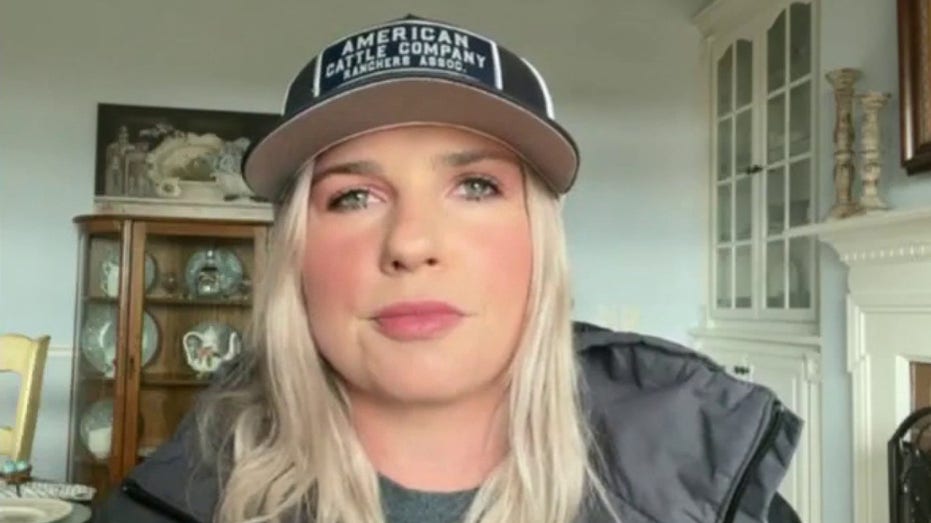Dairy farmer calls on USDA to 'protect' American-grown production as the nation faces shortages, rising costs
Tennessee farmer Stephanie Nash argues Biden admin policies are prioritizing foreign producers over American farmers, ranchers
Dairy farmer predicts serious food shortages next year
Dairy farmer Stephanie Nash criticizes the USDA and Biden administration over food production policies and calls on more support for American grown products, warning of food shortages into 2023.
A Tennessee dairy farmer is calling out the Biden administration and the U.S. Department of Agriculture for putting America's food security at risk, warning higher prices and food shortages are likely in 2023.
"We're not going to see any change in the U.S. market for food prices for Americans," dairy farmer Stephanie Nash told "Varney & Co," Thursday. "You look at Ukraine, you look at Russia, you look at what's going on in the Netherlands… I think there's going to be a lot of food shortages next year."
Nash argued that policies towards American-grown agriculture products are one of the key factors impacting these expected trends.
"I think the USDA needs to do a better job of implementing programs to feed Americans, to support American grown and just be stronger," Nash Thursday. "You look at the markets, you look at imports and exports. We continue to support other countries, and we're not even supporting the American people. "
US FARMER WORRIED BIDEN'S POLICIES PUT INDUSTRY IN JEOPARDY
In November, the USDA reported that, for the first time in U.S. history, the country would be importing more agricultural products than exporting. This new foreign dependence increases America's food insecurity as other global factors add additional fears over food supply.

Dairy farmer Stephanie Nash calls for better policies to support American grown products. (FOX Business / Fox News)
"I'm telling the government and our politicians and our leaders, what are you doing? What are you doing with American Grown? How are you supporting our family farmers and ranchers? And how are you supporting Americans at the grocery store?" Nash posited.
ARE HIGHER FOOD COSTS CHANGING OUR EATING HABITS?
In addition to increased foreign dependence on food, the Bureau of Labor Statistics reported a 10.6% increase in food prices in November, further pinching pockets of American consumers.
Swiftly's True Cost of a Grocery Shop survey indicated that nearly 70% of shoppers are struggling to pay for their groceries after months of persistent inflation. Americans are often times looking to cheaper alternatives and avoiding purchasing fresh meat, seafood and produce.
"Americans go to the grocery store with confidence they can get the food that they need," Nash said. "And I think we take for granted what farmers and ranchers do around this country. We take for granted the products that we produce, the products that we produce here in America."
Feeding America facing challenges from inflation as food demand surges
Feeding America president and COO Katie Fitzgerald discusses how increased food prices are affecting America's food banks on 'Cavuto: Coast to Coast.'
Nash debunked the idea that these higher costs for products at grocery stores are enabling farmers and producers to yield a high profit.
"You have JBS, Cargill, Tyson, they're making marginal record profits this year. All family farmers and ranchers. While we see Texas beef selling record numbers because they have no water. And you're seeing California dairy farms sell off because they can't afford to feed. And it's just crazy."
Rail strike raises concerns for farmers impacting fertilizer shipments, costs
FOX Business reporter Madison Alworth discusses how farmers fear that a looming rail strike will affect fertilizer shipments and a raise in costs
The consumer trends at grocery stores further amplify the financial stress felt by many of America's farmers and ranchers as labor laws, inflation and imports attack American production. In November, fertilizer prices rose 45% year-over-year which is one of many inflated costs for farmers hurting profits.
"We need to fix that," Nash said. "We need to fix the way America runs and how we support our family farmers and ranchers."
Others in America's agriculture industry are calling on a change in policy from the Biden administration to restore strength to U.S. agriculture, including Nicole Ort Moke, the manager of Ort Farms, in Long Valley, New Jersey.
Dems’ anti-fossil fuel policy is ‘driving down profit’ for American farmers: Madison Alworth
FOX Business’ Madison Alworth reports live from a struggling grain and vegetable farm in New Jersey to discuss how the Biden administration’s policies have impacted local farms.
"We have the ability to feed our people and feed the world and have a good position in the world market," Moke told FOX Business' Madison Alworth last month. "If the policies don’t allow us to take advantage of the opportunity, it’s really detrimental to the industry, detrimental to small businesses and our national security."
CLICK HERE TO READ MORE ON FOX BUSINESS
Like Moke, Nash shared the difficulties of being a farmer as the nation continues to reel under the weight of inflation. She argued one way to better support American business and the U.S. economy is to return strength to American growers.
"We need to protect our rural communities and look for a future that is stronger in our food security," she said.
FOX Business' Kayla Bailey and Daniella Genovese contributed to this report.
























